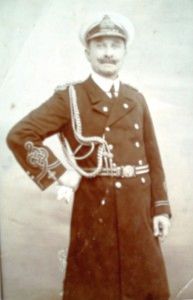Difference between revisions of "Giovanni Giumarra"
m (Tonisant moved page Ġiovanni Giumarra to Giovanni Giumarra: correct title) |
m (removed Category:Conductors from Sicily; added Category:Bandmasters using HotCat) |
||
| Line 14: | Line 14: | ||
{{DEFAULTSORT:Giumarra, Ġiovanni}} | {{DEFAULTSORT:Giumarra, Ġiovanni}} | ||
[[Category:A-Z of the Malta Music Scene]] | [[Category:A-Z of the Malta Music Scene]] | ||
[[Category: | [[Category:Bandmasters]] | ||
[[Category:Born in 1861]] | [[Category:Born in 1861]] | ||
[[Category:Died in 1936]] | [[Category:Died in 1936]] | ||
Revision as of 13:54, 20 May 2020
Clean-up Needed
The text currently on this page needs further work. It was most likely imported or reproduced from a website associated with the subject of the page - possibly through a process involving far-from-perfect machine translation, often with awkward results. It is awaiting the attention of an experienced M3P editor, which could be you. It may be slightly out of date, or may need other elements taken care of appropriately, including proofreading or copy-editing for grammar and style.
This page is a stub
Stub pages are like acorns. The first seed has been planted, but you can help them grow! There may, for example, also be other M3P resources linking to it. You can help by expanding this page.
Among those band clubs who wanted to have a foreigner as Musical Director, the Duke of Edinburgh Band club was one of the first. This dream became reality when at the end of 1906, Mro Ġiovanni Giumarra arrived in Malta from Sicily to succeed Mro Magri Grech as Maestro. Mro. Ġiovanni Giumarra was born in Comiso, Sicily, in 1861, son of Vincenzo and Annunziata Baglieri.
At 12 years of age he was already in the musical sphere and showing his huge potential. Following a success in an examination, he was appointed substitute director and clarinet soloist with the Sortino Band. A few years later, he was also appointed assistant director and Director of the Noto Municipal Band. During his tenure as Maestro of this band, great progress was registered to the extent that it was being invited to perform musical programmes throughout the year. Apart of being Musical Director of the Duke of Edinburgh Band, Mro Giumarra was also director of the Vilhena Band Club of Floriana, Soċjeta Filamonika San Ġorġ of Bormla and also Soċjeta Filarmonika Leone Band Club of Victoria, Gozo where he remained Maestro for 10 years.
Mro Giumarra was well trained in instrumentalisation of band clubs, and following musical programmes, he always left a good impression, especially in programmes which were directed in the Royal Theatre, Manoel Theatre and Circolo Brittania. He left a number of compositions, where it was clear that these were of other level. He used to compose both sacred and also non-sacred music, and most of them were printed and published by a number of music houses.
He also composed hundreds of marches, symphonies, intermezzi and other composition which were popularly sought after in Europe and even in the Americas and Africa. In two of his last compositions, Mro. Giumarra showed his passion for Vittoriosa, where he dedicated the Recordare to the leadership of the Parish Church, whilst Ai Caduti del 1565 was dedicated to all Vittoriosa citizens.
His vast successes in international musical competitions in which he participated show that he was a high profile musician, especially with the honours given in such competitions. Two of these, considered as the most prestigious, were a First Grade Diploma and a Silver Medal in Palermo and in another one in Salerno, he obtained another First Grade Diploma and the Golden Medal. After 29 years in the local band clubs scene, Mro. Giumarra died on Christmas eve of 1936 in Ħamrun.
